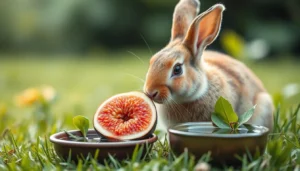As a rabbit owner, you want to make sure your furry friend gets the best care possible, and that starts with a healthy diet. We all love to share our favorite snacks with our pets, but it’s important to know what’s safe for them. Figs are sweet and delicious, and you might wonder if your rabbit can enjoy them too.
This article explores whether can rabbits eat figs, how to offer them if they are, and whether other parts of the fig plant, like the leaves, stems and skin, are okay for your rabbit to nibble on.
Nutritional Profile of Figs
Figs are packed with nutrients that are great for us humans—they’re full of fiber, vitamins like A, B, and C, and minerals such as potassium and calcium. These nutrients help keep our bodies strong and healthy. But when it comes to rabbits, their needs are a bit different. Rabbits require a diet high in fiber, mainly from hay, with fresh vegetables as a supplement. While figs do contain some fiber, they also have a lot of sugar.
Rabbits’ digestive systems aren’t built to handle a lot of sugar, which can lead to health problems if they have too much. So, while figs are healthy for humans, they aren’t the best choice for your rabbit’s daily diet. A tiny piece of fig might be okay now and then, but it’s important not to overdo it.
Can Rabbits Eat Figs? Understanding the Health Implications
Yes, rabbits can eat figs, but only in very small amounts, and even then, it should be a rare treat. Rabbits’ digestive systems are quite delicate, and too much sugar can cause problems like obesity or an upset stomach.
The best foods for rabbits are those that mimic what they would eat in the wild, which is mostly hay and leafy greens. If you do decide to give your rabbit a fig, make sure it’s just a tiny piece. Even then, you should keep an eye on your rabbit afterward to make sure they don’t have any bad reactions. If your rabbit shows any signs of discomfort, it’s best to avoid figs in the future.

Can Rabbits Safely Enjoy Figs?
Rabbits can safely enjoy figs, but only if they are given in moderation. Think of figs as a special treat that you offer only on rare occasions, rather than a regular part of their diet. When you do give your rabbit a fig, make sure it’s fresh and that you’ve washed it thoroughly to remove any chemicals or pesticides.
Dried figs should be avoided because they have even more concentrated sugar, which isn’t good for rabbits. In addition to figs, it’s important to offer a variety of other rabbit-safe foods to keep your pet happy and healthy. Always monitor your rabbit after introducing any new food, and consult your vet if you have any concerns.
Can Rabbits Have Dried Figs?
Dried figs are not a good choice for rabbits because they contain a lot more sugar than fresh figs. When figs are dried, they lose water, which makes the sugar content much higher. Rabbits’ bodies aren’t made to handle that much sugar, so feeding them dried figs can lead to problems like weight gain or even tooth decay.
If you want to give your rabbit a fig, stick to a small piece of fresh fig instead. And remember, even fresh figs should only be an occasional treat. Many other treats are better for your rabbit, so it’s best to keep dried figs off the menu.
Do Rabbits Prefer to Eat Fig Skin?
Some rabbits might be curious about fig skin, and it’s generally safe for them to eat if it’s clean. However, fig skin can be tougher than the flesh, which might make it a little harder for some rabbits to digest. If your rabbit seems interested in the skin, start by offering just a small piece and see how they react. As always, it’s important to watch your rabbit for any signs of discomfort.
If they seem to enjoy the skin and have no problems, you can occasionally offer it along with the flesh. But if they show any signs of digestive upset, it’s best to avoid giving them the skin in the future.
Can Rabbits Like to Eat Fig Leaves?
It’s best to avoid giving your rabbit fig leaves. While some animals might eat fig leaves without any issues, they contain a substance called ficin, which can irritate a rabbit’s digestive system. Eating fig leaves could cause your rabbit to have an upset stomach or other digestive problems.
Plus, fig leaves can taste bitter, so your rabbit might not even like them. To be safe, it’s better to stick to other leafy greens that are known to be safe and healthy for rabbits, like romaine lettuce or kale.
Can Rabbits Like to Eat Fig Stems?
Fig stems are another part of the fig plant that isn’t suitable for rabbits. The stems are tough and fibrous, which makes them hard for rabbits to chew and digest. There’s also a chance that fig stems could irritate your rabbit’s digestive system, which could lead to discomfort or even more serious health issues.

If your rabbit has access to fig plants, make sure they can’t get to the stems. Instead, offer them safe, chewable treats like hay, fresh veggies, or rabbit-safe toys that will help keep their teeth healthy and provide them with mental stimulation.
Safe Feeding Practices
When it comes to feeding figs to your rabbit, it’s important to be careful and follow safe feeding practices. Figs should only be given as a special treat, not as a regular part of their diet. A small piece of fig, about the size of a teaspoon, is enough. Always choose fresh figs and avoid dried figs because of the high sugar content. Before you give a fig to your rabbit, wash it thoroughly to remove any dirt or chemicals.
Along with figs, make sure your rabbit’s diet is balanced with plenty of hay, which is essential for their digestion. Fresh vegetables like leafy greens can also be included, and a small number of pellets can help round out their diet. If you’re introducing figs or any new food to your rabbit, start with a small amount and watch for any signs of digestive upset. If your rabbit seems fine, you can occasionally give them a fig as a treat. But if you notice any changes in your rabbit’s behavior or digestion, it’s best to stop and talk to your vet.
Alternative Treats for Rabbits
If you’re looking for healthier treats to give your rabbit, there are many great alternatives to figs that your rabbit will love. Fresh vegetables like carrots, celery, and leafy greens are perfect safe and nutritious treats. These veggies are low in sugar and high in fiber, which helps keep your rabbit’s digestive system in good shape. Herbs like parsley, cilantro, and basil can also make a tasty treat that adds variety to your rabbit’s diet.
Fruits can also be a treat for your rabbit, but they should be given in small amounts because of their natural sugar content. Some good options include small slices of apple (without seeds), pear, or berries like strawberries and blueberries. These fruits should be an occasional treat, not a regular part of their diet. Hay-based treats are another excellent choice for rabbits. You can find hay cubes or compressed hay snacks that are made specifically for rabbits and provide the fiber they need while helping to keep their teeth healthy.
Conclusion
In conclusion, rabbits can eat figs, but being careful is important. Figs should only be an occasional treat, given in minimal amounts because of their high sugar content. Fresh figs are safer than dried figs, and other parts of the fig plant, like leaves, stems, and skin, should be given sparingly or avoided altogether. Your rabbit’s main diet should consist of hay, fresh vegetables, and a small number of pellets, with occasional treats to add variety.
When introducing figs or any new food to your rabbit, it’s crucial to monitor them closely for any signs of digestive upset or changes in behavior. If you notice any problems, stop giving the fig and consult your veterinarian. By following these guidelines, you can ensure that your rabbit enjoys a healthy and balanced diet that keeps them happy and thriving. Remember, the key to a happy and healthy rabbit is providing them with a diet that meets their specific needs, so always choose treats wisely and in moderation.

